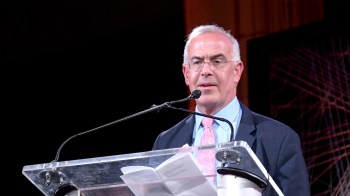
How to problem-solve through economic issues

Identifying problems, especially economic issues, can seem obvious. What’s harder is figuring out the constraints that prevent them from being solved. But there are ways to arrive at solutions.
It’s the subject of a new book, “The Economic Superorganism” by Carey King, a research scientist and assistant director of the Energy Institute at the University of Texas at Austin. He recently spoke with Marketplace’s Andy Uhler.
The following is an edited transcript of Uhler and King’s conversation.
Andy Uhler: So when we think of the traditional economic model of the energy industry, what does that model or what do those models get wrong?
Carey King: Well, my narratives in my book are a little bit more about macroeconomic narratives, or how do people approach what the economy is and how does it grow in general? And so I simplify into the techno optimistic narrative of infinite growth and substitutability of technologies. On the opposite end of that spectrum is technorealism. Which is to say, well, there are constraints in the world, there are things like physical laws that we understand. And there are constraints of time. And we need to take these into account to actually understand what’s possible and how the economy evolves. So those are really the two narratives and they get applied to the energy industry. And by applying them, I would say, less accurate narratives to how the energy system interacts with the broader economy. I think we get answers from reports and analyses that are less accurate than we can do.
Uhler: Because you’re talking about using the data to then ask different questions and also sort of come up with different narratives and ultimately, different answers. Right?
King: Right. So everybody’s kind of coming up with their own narratives. In my book, the narratives are in some sense, strawmen, but they’re set up so that I can then go into detail about well, here’s a coherent way to think about what the economy is. And one of those ways is to say that the economy is an organism, like living organisms that need energy and resources to grow. It needs energy and resource consumption to maintain itself. And it has to distribute these resources internally. So by taking these kinds of physical aspects into account, we have a better interpretation for the economic patterns that we see.
Andy Uhler: I’m curious sort of how your model fits with this new shift in renewable energy. And in sort of the way that we think about zero carbon as well, how does it fit?
King: So a lot of the shift of the energy system and other industries in general is to lower marginal cost in general. So you might have higher capital costs, which we take into account or when we think about things like solar and photovoltaic systems and batteries, they have a high upfront capital cost, lower marginal cost. And this is essentially the same kind of growth pattern we see in biology and ecosystems in the sense that the last bits of growth of an animal consume less energy than the previous set. So it’s a similar pattern that we might see in ecosystems.
There’s a lot happening in the world. Through it all, Marketplace is here for you.
You rely on Marketplace to break down the world’s events and tell you how it affects you in a fact-based, approachable way. We rely on your financial support to keep making that possible.
Your donation today powers the independent journalism that you rely on. For just $5/month, you can help sustain Marketplace so we can keep reporting on the things that matter to you.

















